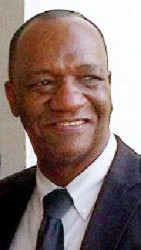A Partnership for National Unity (APNU) MP Joseph Harmon says the questions he is asking of Prime Minister Samuel Hinds concerning the US$32 million fibre optic cable, E-Governance Project are inspired solely by the poor manner in which it is being run.
The Parliamentary Order Paper which was sent out last week revealed that Harmon intended to ask Hinds to clarify three matters related to the long-delayed project.
Harmon’s questions, to which Hinds is required to respond in writing, asks the Prime Minister

to detail the costs associated with the prolonging of the project time-frame, the cost attached to the design modification needed, and the benefits and wages being received by E-Governance Project Manager Alexei Ramotar.
Hinds told Stabroek News last evening that the government has a very good response to Harmon’s questions, but that the response is not yet in writing and was not ready for yesterday’s National Assembly sitting. He said that the response will be submitted at a subsequent sitting, but in the meantime, Finance Minister Ashni Singh has offered Harmon a very aggressive response.
This past Monday, Singh, via a press release, lashed Harmon’s questions as destructive to Guyana’s growth, and suggested that Ramotar’s eligibility for the job is only being challenged by Harmon and APNU because he is the son of President Donald Ramotar. Singh said that APNU’s actions, together with those of the Alliance for Change (AFC), on this and other matters, will only serve to “rid Guyana of all its human and financial resources.”
Singh continued, “as if chasing away investors is not enough to satisfy their lust for power afforded by their one seat majority, they now move to attack and ultimately chase our human resources: our young qualified professionals working in government.”
Harmon though, says Singh’s arguments are fallacious. The E-Governance Project, he told reporters yesterday at a press conference just before the parliamentary sitting, is two years past its deadline. Additionally, its managers are talking of modifying the existing designs, which will likely push the completion date well into the future.
It is “inconceivable,” Harmon lamented, that there are needs for modification at this stage of the project. He also said that while the project drags out beyond the initially decided upon deadline, those charged with its management continue to be paid, thereby running up the initial amounts that might have been budgeted for salaries.
These reasons, and these reasons alone, Harmon said, fueled APNU’s decision to raise questions about Alexei Ramotar’s management of the project, the salaries and benefits he is paid, the projected costs to modify the project designs, and the additional costs which have been incurred as a result of its managers’ inability to finish it in time.
Harmon is also questioning the basis on which Alexei Ramotar was hired. He is also asking Hinds to provide the details of Ramotar’s curriculum vitae, and to elaborate on the process via which he was selected to be the project’s management. He noted Singh’s statements that Ramotar was “deemed the most qualified for the job” at the time the job was being offered, and said that the word “deemed” refers to an action that was taken as a result of the lack of a clear system.
Singh went on to say that Ramotar “remains Guyana’s most qualified in this field, with a masters in Computer Science from the University of Waterloo, over a decade of work experience where he led numerous projects in this field, and (received) several academic awards and publications.” The specifics though, of the projects led by Ramotar, along with his awards and publications were not elaborated on.
Despite the praise given to Ramotar’s qualifications, Harmon is convinced that his failure to execute the project within the projected time-frame has called his competency into question, and rebuffed Singh’s claim that his decision to publicly question Ramotar “was strategically done because Alexei Ramotar is the son of President Donald Ramotar.”
As such, Harmon said, it is imperative that the government say who deemed Ramotar the most qualified, and detail the criteria that were used to select Ramotar as the project’s manager. It should be noted though, that while Harmon says questions about Ramotar’s salary were asked to see how much money continues to be spent on the delayed project, he has not questioned the salaries of the other personnel attached to the project. Asked why APNU has not asked for salary and benefits of the other employees attached to the project, Harmon said that consideration will be given to such a question as the situation continues to develop.
He said that the responses given by government are likely to generate further questions, and cautioned that his initial questions are “only the tip of the iceberg.”
He maintains that his questions only serve to ensure that there is transparency and accountability in the spending of public funds, and shared that he was not at all pleased to read a Guyana Times report which quotes Ramotar as saying that the questions about the delay in the project, coupled with the need for modification at this stage are no big deal.
Harmon says that the issue is a very big deal, especially since it is possible that additional funds will have to be pumped into the project to facilitate its continuation, and eventual completion. He added that the matter is even more interesting considering that just last year the government told public servants that it could not afford to pay more than a 5% wage increase.
As far as Harmon is concerned, Singh’s statement is nothing more than a smokescreen. He is convinced that the Finance Minister’s statements are aimed at changing the focus on the matter, and to create an atmosphere that would decrease the impact of the answers which the government will now be forced to release.





